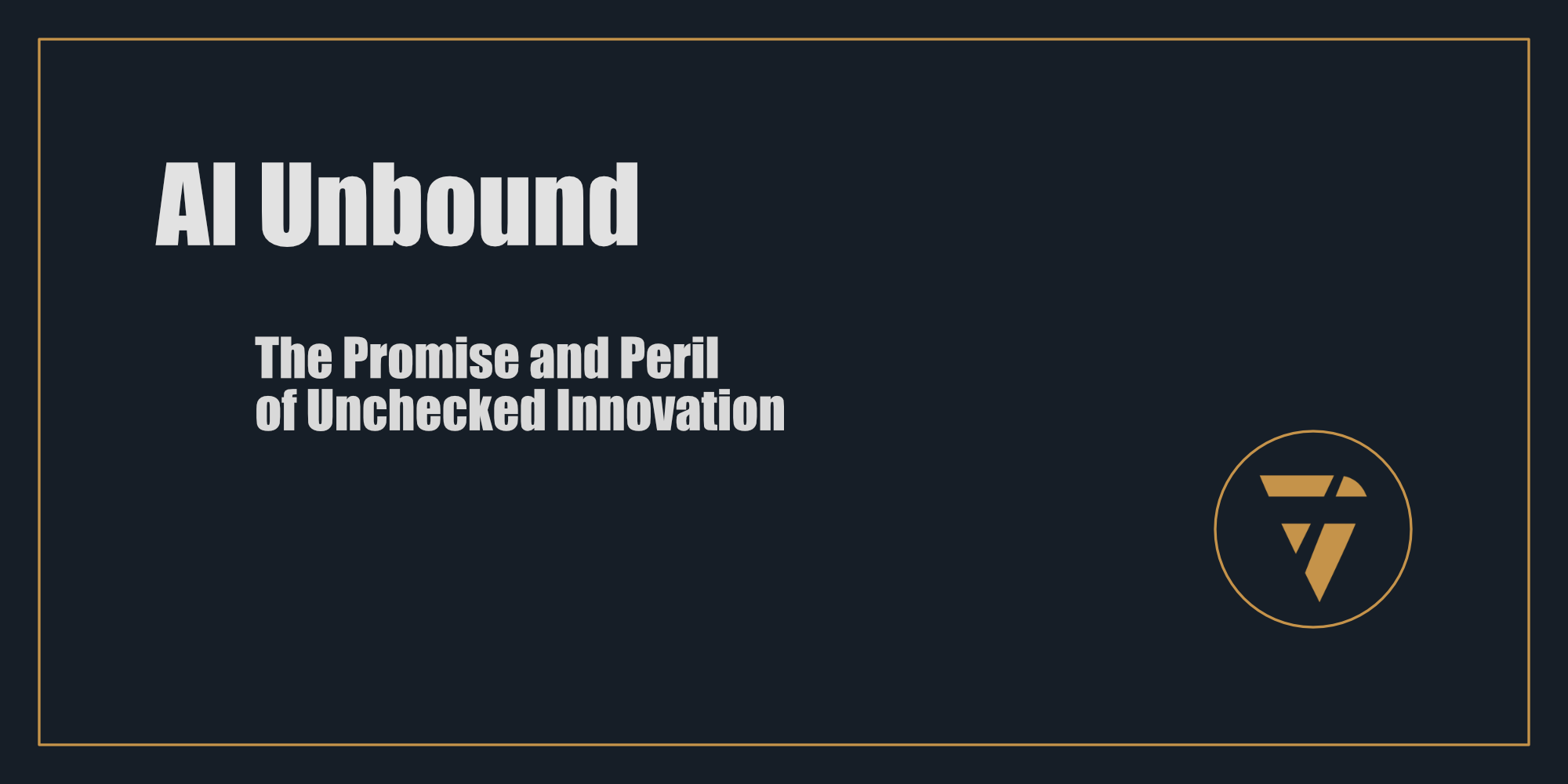AI Unbound
The Promise and Peril of Unchecked Innovation

What happens when humanity builds something it doesn’t fully understand, or control? AI Unbound is more than a technological milestone; it’s a revolution that could redefine power, economies, and societies, for better or worse.
The Double-Edged Sword of AI
In Top Risks 2025, AI Unbound highlights the rapid rise of artificial intelligence as a transformative force that’s both exhilarating and terrifying. AI is no longer a tool to support human decisions, it’s making decisions of its own, with implications that reach far beyond the digital realm.
From autonomous weapons and mass disinformation campaigns, to breakthroughs in medicine and logistics, AI is reshaping industries, governments, and human interaction. Yet, this acceleration comes with a sobering reality: we lack the frameworks to govern AI responsibly. The risks of misaligned goals, unintended consequences, and malicious uses are growing as fast as the opportunities.
The Forces Driving AI Unbound
The AI revolution is being driven by three key dynamics:
- Exponential Growth in Capability:
Advances in machine learning and neural networks have made AI systems faster, smarter, and more versatile. Generative AI models like ChatGPT and image synthesis tools can now create content indistinguishable from human work. - Global Competition:
Nations and corporations are locked in an AI arms race. Governments are investing billions to secure technological dominance, while companies race to out-innovate their competitors, often at the expense of safety and oversight. - Lack of Regulation:
Unlike traditional industries, AI development has outpaced regulation. There’s little agreement on ethical standards, oversight mechanisms, or accountability, leaving the field vulnerable to misuse.
These forces have unleashed an unprecedented wave of innovation, one that’s difficult to contain.
The Risks of Unchecked AI
While AI offers extraordinary potential, its dangers are equally profound:
- Mass Disinformation:
AI-generated fake news, deepfakes, and targeted propaganda threaten to erode trust in information, destabilizing democracies and polarizing societies. - Autonomous Weaponry:
The development of AI-driven military systems, from drones to cyberweapons, raises the stakes for conflict escalation and accidental engagements. - Job Displacement:
Automation driven by AI is reshaping labor markets, displacing workers in industries from logistics to creative sectors, while widening economic inequality. - Algorithmic Bias:
AI systems trained on biased datasets can perpetuate and even amplify discrimination, affecting decisions in hiring, lending, and policing. - Loss of Human Control:
As AI systems become more autonomous, the risk of unintended actions grows. The lack of interpretability in many models makes it difficult to predict or prevent harmful outcomes.
The Opportunities of AI—If Harnessed Wisely
AI’s potential isn’t inherently destructive. With responsible governance and innovation, it can be a powerful force for good:
- Medical Breakthroughs:
AI is accelerating drug discovery, enabling personalized medicine, and improving diagnostics, with the potential to save millions of lives. - Sustainability Solutions:
From optimizing energy use to advancing climate modeling, AI is a critical tool for combating environmental challenges. - Enhanced Productivity:
AI-driven automation can streamline workflows, reduce costs, and unlock new levels of efficiency across industries. - Global Connectivity:
By breaking down language barriers and enabling real-time collaboration, AI fosters a more interconnected world.
The challenge lies in ensuring these benefits are realized without letting the risks spiral out of control.
Governing AI in an Unbound Era
- Invest in AI Literacy:
Organizations and governments must educate their stakeholders on AI’s capabilities, limitations, and risks to foster informed decision-making. - Prioritize Ethical Design:
Companies should embed ethical considerations into AI development, from bias mitigation to transparency and accountability. - Push for Regulation:
Advocate for global agreements on AI safety standards, governance frameworks, and enforcement mechanisms. Collaboration is critical to preventing misuse. - Develop Contingency Plans:
Prepare for AI-related disruptions, from cybersecurity threats to workforce changes, by investing in resilience and adaptability. - Foster Public-Private Partnerships:
Governments, corporations, and NGOs must work together to ensure AI benefits society while minimizing harm. Shared responsibility is the only way forward.
The Power of Choice
AI unbound isn’t just a technological shift, it’s a moral and strategic one. We have the tools to shape this future responsibly, but only if we act with urgency and foresight. The question isn’t whether AI will transform our world, it’s how we’ll decide to guide that transformation.
How are you preparing for the opportunities and risks of AI Unbound? Let’s explore strategies to innovate responsibly, govern wisely, and thrive in a world shaped by intelligent machines.
This Substack is reader-supported. To receive new posts and support my work, consider becoming a free or paid subscriber.
This is what I’m working on. Tell me what you think, I enjoy the conversation! Subscribe and follow the work in real time.
Thanks!
B
AI unbound is reshaping the world, faster than we can govern it. From disinformation to medical breakthroughs, the stakes are massive. Prioritize ethics, push for regulation, and prepare for disruption. The future is intelligent, let’s guide it wisely.
PS -





